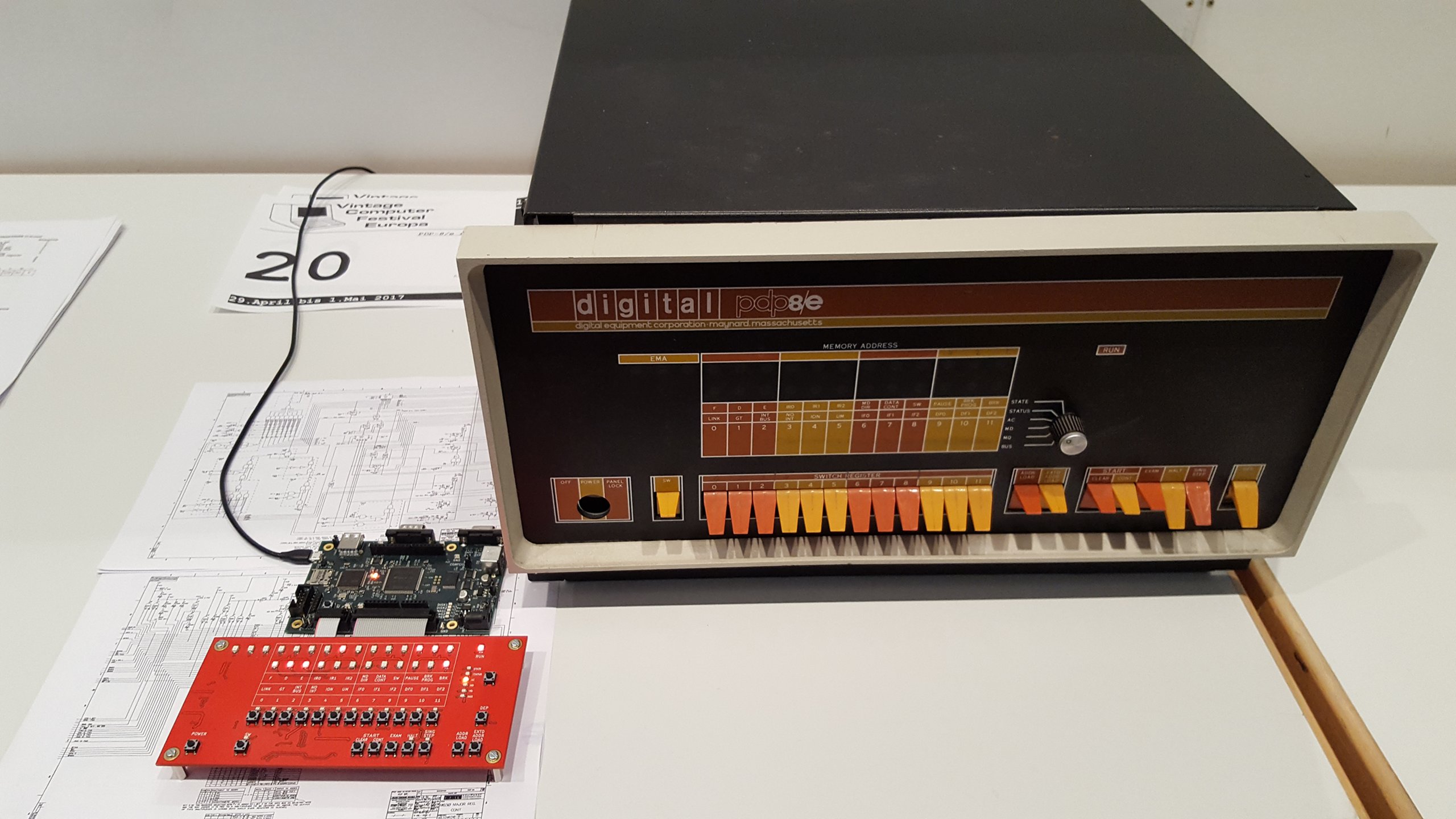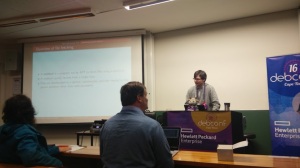Andreas Bombe: PDP-8/e Replicated Introduction
I am creating a replica of the DEC PDP-8/e architecture in an FPGA from
schematics of the original hardware. So how did I end up with a project like
this?
The story begins with me wanting to have a computer with one of those front
panels that have many, many lights where you can really see, in real time, what
the computer is doing while it is executing code. Not because I am nostalgic
for a prior experience with any of those I was born a bit too late for that
and my first computer as a kid was a Commodore 64.
Now, the front panel era ended around 40 years ago with the advent of
microprocessors and computers of that age and older that are complete and
working are hard to find and not cheap. And even if you do, there s the issue
of weight, size (complete systems with peripherals fill at least a rack) and
power consumption. So what to do build myself a small one with modern
technology of course.
While there s many computer architectures of that era to choose from, the
various PDP machines by DEC are significant and well known (and documented) due
to their large numbers. The most important are probably the 12 bit PDP-8, the 16
bit PDP-11 and the 36 bit PDP-10. While the PDP-11 is enticing because of the
possibility to run UNIX I wanted to start with something simpler, so I chose the
PDP-8.
The Original
DEC started the PDP-8 line of
The Original
DEC started the PDP-8 line of computers programmed data processors designed
as low cost machines in 1965. It is a quite minimalist 12 bit architecture based
on the earlier PDP-5, and by minimalist I mean seriously minimal. If you are
familiar with early 8 bit microprocessors like the 6502 or 8080 you will find
them luxuriously equipped in comparison.
The PDP-8 base architecture has a program counter (PC) and an accumulator
(AC)1. That s it. There are no pointer or index registers2.
There is no stack. It has addition and AND instructions but subtractions and OR
operations have to be manually coded. The optional Extended Arithmetic Element
adds the MQ register but that s really it for visible registers. The Wikipedia
page on the PDP-8 has a good detailed
description.
Regarding technology, the PDP-8 series has been in production long enough to get
the whole range of implementations from discrete transistor logic to
microprocessors. The 8/e which I target was right in the middle, implemented
in TTL logic where each IC contains multiple logic elements. This allowed the
CPU itself (including timing generator) to fit on three large circuit boards
plugged into a backplane. Complete systems would have at least another board for
the front panel and multiple boards for the core memory, then additional boards
for whatever options and peripherals were desired.
Design Choices and Comparisons
I m not the only one who had the idea to build something like that, of course.
Among the other modern PDP-8 implementations with a front panel, probably the
most prominent project is the Spare Time Gizmos
SBC6120 which is a
PDP-8 single board computer built around the Harris/Intersil HD-6120
microprocessor, which implementes the PDP-8 architecture, combined with a nice
front panel. Another is the
PiDP-8/I, which is
another nice front panel (modeled after the 8/i which has even more lights)
driven by the simh simulator running under
Linux on a Raspberry Pi.
My goal is to get front panel lights that appear exactly like the real ones in
operation. This necessitates driving the lights at full speed as they change
with every instruction or even within instructions for some display selections.
For example, if you run a tight loop that does nothing but increment AC while
displaying that register, it would appear that all lights are lit at equal but
less than full brightness. The reason is that the loop runs at such a high speed
that even the most significant bit, which is blinking the slowest, is too fast
to see flicker. Hence they are all effectively 50% on, just at different
frequencies, and appear to be constantly light at the same brightness.
This is where the other projects lack what I am looking for. The PiDP-8/I is a
multiplexed display which updates at something like 30 Hz or 60 Hz, taking
whatever value is current in the simulation software at the time. All the
states the lights took inbetween are lost and consequently there is flickering
where there shouldn t be. On the SBC6120 at least the address lines appear to
update at full speed as these are the actual RAM address lines. However the
used 6120 microprocessor does not have required data for the indicator display
externally available. Instead, the SBC6120 runs an interrupt at 30 Hz to trap
into its firmware/monitor program which then reads the current state and writes
it to the front panel display, which is essentially just another peripheral. A
different considerable problem with the SBC6120 is its use of the 6100
microprocessor family ICs, which are themselves long out of production and not
trivial (or cheaply) to come by.
Given that the way to go is to drive all lights in step with every
cycle3, this can be done by a software running on a dedicated
microcontroller which is how I started or by implementing a real CPU with
all the needed outputs in an FPGA which is the project I am writing about.
In the next post I give an overview of the
hardware I built so far and some of the features that are yet to be
implemented.
- With an associated link bit which is a little different from a carry bit in that it is treated as a thirteenth bit, i.e. it will be flipped rather than set when a carry occurs.
[return]
- Although there are 8 specially treated memory addresses that will pre-increment when used in indirect addressing.
[return]
- Basic cycles on the PDP-8/e are 1.4 s for memory modifying cycles and fast cycles of 1.2 s for everything else. Instructions can be one to three cycles long.
[return]
- With an associated link bit which is a little different from a carry bit in that it is treated as a thirteenth bit, i.e. it will be flipped rather than set when a carry occurs. [return]
- Although there are 8 specially treated memory addresses that will pre-increment when used in indirect addressing. [return]
- Basic cycles on the PDP-8/e are 1.4 s for memory modifying cycles and fast cycles of 1.2 s for everything else. Instructions can be one to three cycles long. [return]

 A week has gone by and another small sharing about Doha and one package that quite a few of us use everyday but don t think much of them.
Let s start with Doha with these two pictures which tells/shares a bit about what the Doha of today is like
A week has gone by and another small sharing about Doha and one package that quite a few of us use everyday but don t think much of them.
Let s start with Doha with these two pictures which tells/shares a bit about what the Doha of today is like



